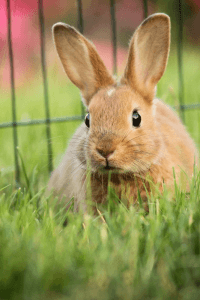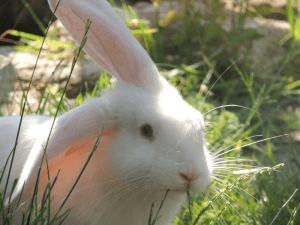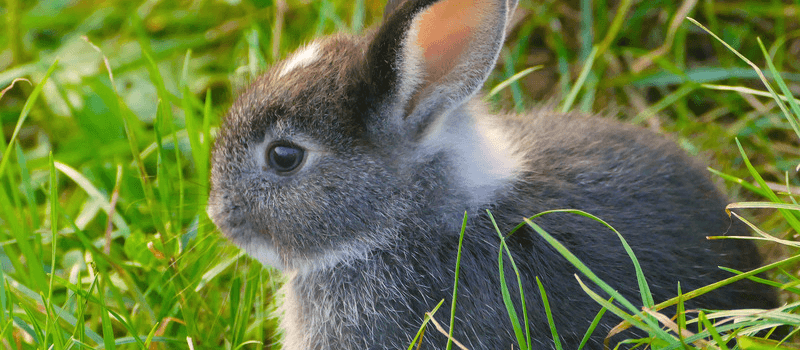Vets are often presented with rabbits that have a variety of illnesses due to the long-term feeding of an inappropriate diet.The PDSA charity commissions the PDSA Animal Wellbeing report annually to gather vital information about how the UK’s pet owners are housing, feeding and keeping their dogs, cats and rabbits. In the latest published report (2017), it was found that 25% of rabbits are still fed on muesli-based diets and a shocking 33% didn’t have access to an appropriate quantity of hay or fresh grass. Feeding pet rabbits (and guinea pigs) on good quality hay or grass is considered crucial in promoting good dental and gut health.
Top Tips For Feeding Pet Rabbits
- 80% of a rabbit’s diet should be good quality hay, grass or a mixture of both
 Rabbits will spend hours grazing on hay or grass and good quality fodder ensures they don’t have tummy troubles or grow long in the tooth. Rabbits’ teeth grow continuously throughout their lives, so they need to chew hay or grass to help keep their teeth to a correct shape and length. For indoor rabbits, freshly picked grass is suitable, but avoid clippings as they ferment quickly
Rabbits will spend hours grazing on hay or grass and good quality fodder ensures they don’t have tummy troubles or grow long in the tooth. Rabbits’ teeth grow continuously throughout their lives, so they need to chew hay or grass to help keep their teeth to a correct shape and length. For indoor rabbits, freshly picked grass is suitable, but avoid clippings as they ferment quickly
. Alfalfa hay is high in calcium and should generally be avoided in adult rabbits as this can directly cause bladder stones. - Move away from muesli
Although muesli diets are colourful and often more attractive to rabbits than pellets, they encourage selective feeding and predispose the animals to dental disease, due to reduction in chewing behaviour and obesity. Rabbits should be fed a small amount of pellets daily – about an egg cup full – as they are a good complementary source of vitamins and minerals. - Carrot tops, not carrots
Despite the myths perpetuated by cartoon and storybook characters, carrots are actually not good for rabbits as they are high in sugar content, and should only be given occasionally as a treat. Green carrot tops are a more appropriate snack. - 15% of a rabbit’s diet should be made up of a variety of plants and vegetablesVegetables such as courgettes, spring greens, broccoli and curly kale, herbs such as basil and parsley, and plants such as dandelions and burdock are some good options. Avoid certain lettuces like iceberg, which contain a secretion called lactucarium that can be dangerous in large quantities. It is important that you offer a variety of leafy greens rather than rely on the same one or two items every time.
- Eating their own poo is normal
Rabbits produce two types of faecal pellets, although you may only ever see one type! They produce hard, round faecal pellets that are passed throughout the day but usually at dawn and dusk. Rabbits also produce soft faeces called caecotrophs, which contain proteins, fatty acids, vitamins and minerals and serve as an additional source of nutrients. They often aren’t seen because rabbits will ingest them as soon as they are passed and this is perfectly normal behaviour.
If you have purchased or rehomed a new rabbit, why not take advantage Two By Two Veterinary Centre’s free healthcheck for new rabbits? This includes a physical examination, weighing, microchip check, and professional preventative healthcare with dietary advice available throughout the year. During Rabbit Awareness Week, an invitation to all rabbit owners desiring a free of charge healthcheck is extended between 2nd and 10th June 2018.
Andrew Monchar, Director, Two By Two Veterinary Centre

